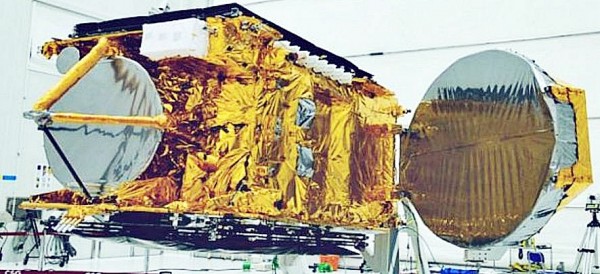By Arthur Dominic J. Villasanta , | May 07, 2017

GSAT-9.
Pakistan wants no part in the South Asia Satellite or GSAT-9, which India described as its "gift to South Asia" (including Pakistan).
GSAT-9 was successfully placed into geosynchronous transfer orbit after being launched into space May 5 by a Geosynchronous Satellite Launch Vehicle (GSLV) from the Satish Dhawan Space Center (SDSC) located in Andhra Pradesh and operated by the Indian Space Research Organization (ISRO).
Like Us on Facebook
GSAT-9 is a geosynchronous communications and meteorology satellite developed by ISRO for the South Asian Association for Regional Cooperation (SAARC), a regional intergovernmental organization and geopolitical union of the South Asia nations Afghanistan, Bangladesh, Bhutan, India, Nepal, the Maldives, Pakistan and Sri Lanka.
Afghanistan, Bangladesh, Bhutan, Nepal, Maldives and Sri Lanka said they will use the facilities provided by GSAT-9. They lauded India's championship of this project.
Pakistan initially declared its intention of participating in the project, and offered India monetary and technical help. India rejected Pakistan's offer, however, saying it wanted the project to be a "gift" and said multinational collaboration such as that proposed by Pakistan would be "time consuming."
Because of this, Pakistan refused to take part in the project and will instead develop its own satellite.
GSAT-9 will provide crucial information on tele-medicine, tele-education, banking and KU-band broadcasting opportunities for television. It's also equipped with state of the art remote sensing technology, which enables real-time weather data collection and information about land surfaces in SAARC nations.
In 2014, Indian Prime Minister Narendra Modi broached the idea of a satellite serving the needs of SAARC member nations as a part of his "Neighborhood First Policy."
"The successful launch of South Asia Satellite is a historic moment. It opens up new horizons of engagement," said Modi soon after GSLV blasted-off.
Pakistan has its own space program supervised by the Space and Upper Atmosphere Research Commission (SUPARCO).
-
Use of Coronavirus Pandemic Drones Raises Privacy Concerns: Drones Spread Fear, Local Officials Say

-
Coronavirus Hampers The Delivery Of Lockheed Martin F-35 Stealth Fighters For 2020

-
Instagram Speeds Up Plans to Add Account Memorialization Feature Due to COVID-19 Deaths

-
NASA: Perseverance Plans to Bring 'Mars Rock' to Earth in 2031

-
600 Dead And 3,000 In The Hospital as Iranians Believed Drinking High-Concentrations of Alcohol Can Cure The Coronavirus

-
600 Dead And 3,000 In The Hospital as Iranians Believed Drinking High-Concentrations of Alcohol Can Cure The Coronavirus

-
COVID-19: Doctors, Nurses Use Virtual Reality to Learn New Skills in Treating Coronavirus Patients










